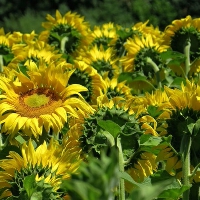Junior three
reaction to a book or an article
This is a small town full of vitality. In spring, the mountain flowers are brilliant, just like many white clouds floating on the green fields. The robin's cry is even more beautiful. In autumn, oaks, birches and other colorful trees jump like flames through the green barriers of pine forests.
However, in such a beautiful environment, the power of death is quietly approaching, everything is leaving with it, and everything begins to change. The chickens were infected with disease, the sheep began to get sick, and the fish in the river died inexplicably. All these were controlled by an evil magic. The robin suddenly disappeared, the adults suddenly died, and even the children were not spared. Death tormented these people and made them feel miserable.
Now there is no sound in this town. In spring, there is no singing of robins. In autumn, there is no singing of foxes. Silence enveloped the whole town.
In fact, I don't like popular science books like Silent Spring, because they are really boring, and most of them are boring data in writing. No sense of mystery and novelty. However, Rachel Carson's Silent Spring brings a different feeling. It made me rethink everything I did to the environment.
Maybe we haven't heard about DDT many times, or even heard about it. DDT is a kind of pesticide, which is white crystal, insoluble in water and soluble in kerosene. It is also called two two three.
Through this book, I really realized the power of this pesticide. It is mentioned in the book that since the use of DDT, the activity of pesticide toxicity upgrading has never stopped. If you think about it now, there are pests on the crops in the farmland, and farmers use pesticides. But how many people have noticed the subtle changes after using pesticides.
Dip chlorophenyl trichloroethane, with a molecular weight of 354.49g and a chemical formula of (ClCH) CH (CCI), played an important role in preventing agricultural diseases and pests, alleviating malaria, typhoid and other hazards in the first half of the 20th century. Because it is very difficult to degrade in the environment and can be accumulated in animal fat, which causes too serious environmental pollution, it has been banned in many countries and regions.
In many cases, it is because we humans have not made rational choices, which leads to the destruction of the food chain in nature. If we use DDT unconsciously, it is very likely that DDT will seep into the groundwater, and the fish will drink the polluted water and accumulate toxins in their bodies. The birds will not go to these fish again, so the birds will also accumulate toxins in their bodies, and then in such a series of cycles, we humans will be hurt finally. Many people may not realize that, We are also a part of nature, and finally we will pay the human price.
E. B. White said, "I feel pessimistic for human beings because they are too single-minded to create benefits for themselves. Our way to treat nature is to make it yield. If we are less suspicious, less arrogant, and learn to adapt to the earth, and treat it gratefully, we will have a better chance of survival."

